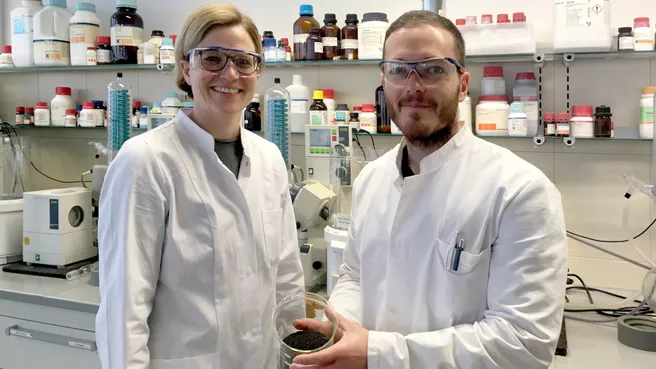What exciting research projects are you working on?
My team and I are looking at the extent to which different environmental conditions, in particular biotic and abiotic stress factors, influence the quality of plants and food. We are particularly interested in which value-adding ingredients, e.g. which resistance-giving, human-toxic or flavor-active components, are formed or changed in their content due to stress. We use the latest metabolomics, sensomics and natural product characterization techniques.
What topic would you like to discuss with students in a relaxed atmosphere?
I would find it very exciting to brainstorm with students about what the diet of the future will look like, how it should perhaps look better and how we can ensure that the growing world population is fed in the future.
And how does practice benefit from your research findings
We are developing new mass spectrometry-based quantification methods that can be used to characterize the "gold standard" of a plant food. On the other hand, our results help to preselect the optimal, resistant, high-quality crop genotypes. In addition, our measurements can be used to monitor and control technological processes in food processing. My team and I are trying to help ensure that future crops and plant-based foods are available in sufficient quantities and, above all, in very high quality.
Publications:
Baumann T, Dunkel A., Schmid C, Schmitt S, Hiltensperger M, Lohr K, Laketa V, Donakonda S, Ahting U, Lorenz-Depiereux B, Heil J, Schredelseker J, Simeoni L, Fecher C, Körber N, Bauer T, Hüser N, Hartmann D, Laschinger M, Eyerich K, Eyerich S, Anton M, Streeter M, Wang T, Schraven B, Spiegel D, Assaad F, Misgeld T, Zischka H, Murray P, Heine A, Korn T, Dawid C, Hofmann T, Knolle PA, Höchst B: “Regulatory myeloid cells paralyze T cell immunity through cell-cell transfer of the metabolite methylglyoxal“. Nature Immunaology. 2020; 21(5): 555–566. Abstract
Kutschera A, Dawid C, Gisch N, Schmid C, Raasch L, Gerster T, Schäffer M, Smakowska-Luzan E, Belkhadir Y, Vlot AC, Chandler CE, Schellenberger R, Schwudke D, Ernst RK, Dorey S, Hückelhoven R, Hofmann T, Ranf S: “Bacterial medium-chain 3-hydroxy fatty acid metabolites trigger immunity in Arabidopsis plants”. Science. 2019; 364: 178-181. Abstract
Dawid C, Hille K: “Functional metabolomics—a useful tool to characterize stress-induced metabolome alterations opening new avenues towards tailoring food crop quality”. Agronomy. 2018; 8(8): 138. DOI:10.20944/preprints201807.0052.v1. Abstract
Dawid C, Hofmann T: “Quantitation and bitter taste contribution of saponins in fresh and cooked white asparagus (Asparagus officinalis L.)”. Food Chemistry. 2013; 145: 427−436. Abstract
Dawid C, Henze A, Frank O, Glabasnia A, Rupp M, Buening K, Orlikowski D, Bader M, Hofmann T: “Structural and sensory characterization of key pungent and tingling compounds from black pepper (Piper nigrum L.)”. J. Agric. Food Chem. 2012: 60(11): 2884–2895. Abstract
More information:
Prof. Corinna Dawid introduces herself in a short video.
Professorship overview of the TUM School of Life Sciences
Professorship website
Editing:
Susanne Neumann
TUM School of Life Sciences
Press and Public Relations
Scientific contact:
Prof. Dr. Corinna Dawid
TUM School of Life Sciences
Chair of Functional Phytometabolomics
corinna.dawid(at)tum.de
